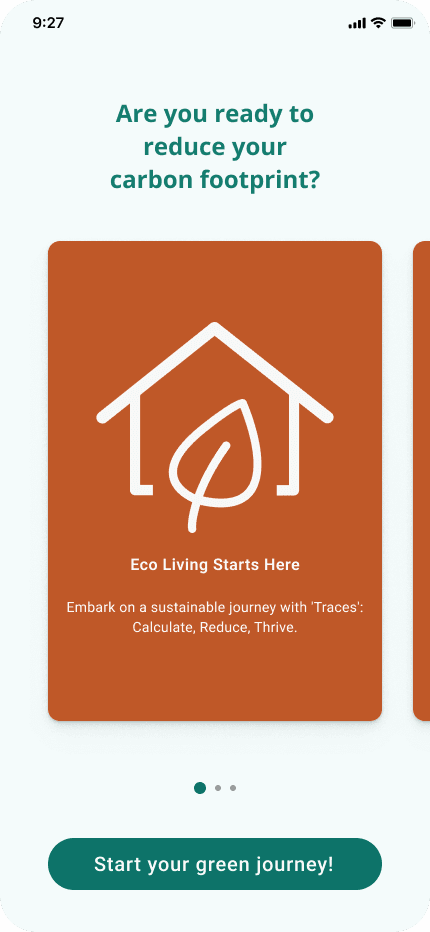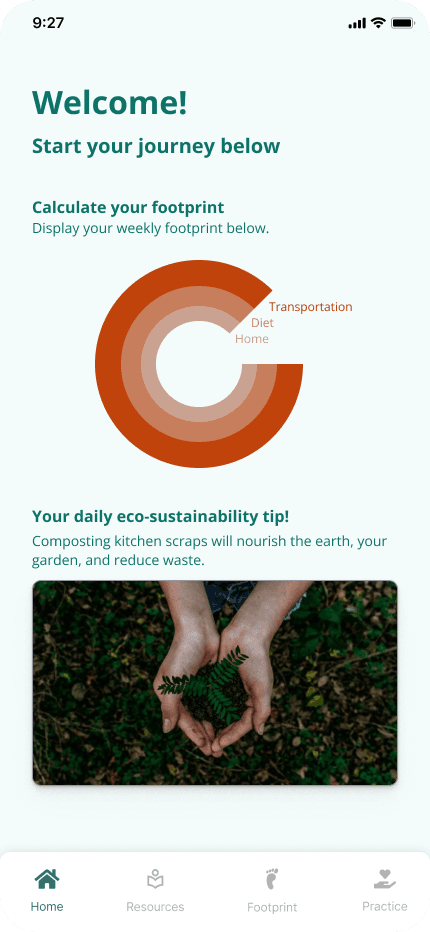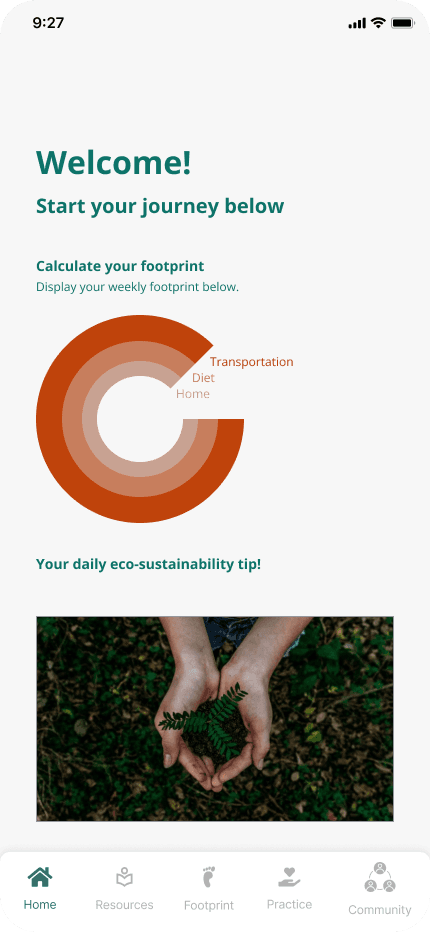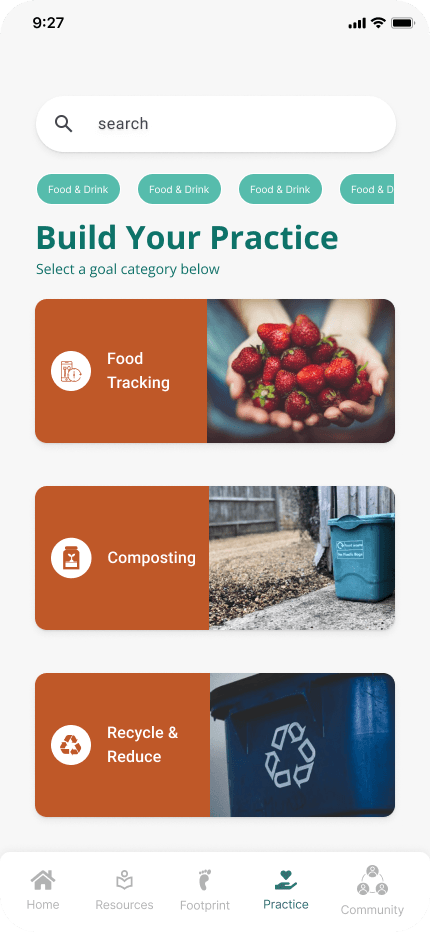habit forming tech
ux design & research
Traces
Traces
Traces
User Experience Design 1
at the Academy of Art University
September - December 2023
Figma, Adobe CC
Role: UX Design & Research




premise
Pinpointing the Problem: Empowering Individuals to Take Charge of Their Carbon Footprint
Pinpointing the Problem: Empowering Individuals to Take Charge of Their Carbon Footprint
Pinpointing the Problem: Empowering Individuals to Take Charge of Their Carbon Footprint
Individuals want tools that make sustainability actionable and engaging. The challenge lies in creating a solution that simplifies carbon tracking, motivates behavior change, and integrates seamlessly into everyday life, empowering users to take measurable steps toward reducing their environmental impact.
Individuals want tools that make sustainability actionable and engaging. The challenge lies in creating a solution that simplifies carbon tracking, motivates behavior change, and integrates seamlessly into everyday life, empowering users to take measurable steps toward reducing their environmental impact.
Individuals want tools that make sustainability actionable and engaging. The challenge lies in creating a solution that simplifies carbon tracking, motivates behavior change, and integrates seamlessly into everyday life, empowering users to take measurable steps toward reducing their environmental impact.
hypothesis
Hypothesis: Guiding Users Toward Sustainable Choices Through Technology
Hypothesis: Guiding Users Toward Sustainable Choices Through Technology
Hypothesis: Guiding Users Toward Sustainable Choices Through Technology
We believe that empowering users with real-time carbon tracking, tailored recommendations, and a sense of community will inspire eco-conscious decisions. By simplifying the complexities of sustainability, the Traces app aims to create a supportive environment where individuals can track their progress, receive personalized guidance, and take actionable steps to reduce their carbon footprint.
We believe that empowering users with real-time carbon tracking, tailored recommendations, and a sense of community will inspire eco-conscious decisions. By simplifying the complexities of sustainability, the Traces app aims to create a supportive environment where individuals can track their progress, receive personalized guidance, and take actionable steps to reduce their carbon footprint.
We believe that empowering users with real-time carbon tracking, tailored recommendations, and a sense of community will inspire eco-conscious decisions. By simplifying the complexities of sustainability, the Traces app aims to create a supportive environment where individuals can track their progress, receive personalized guidance, and take actionable steps to reduce their carbon footprint.
User Interviews and Surveys
Listening to Users: Insights That Shaped Our Approach
Listening to Users: Insights That Shaped Our Approach
Listening to Users: Insights That Shaped Our Approach
Eco-tips, carbon offset information, and community tracking & challenges were named as the three key features essential to help people reduce their environmental impact.
Eco-tips, carbon offset information, and community tracking & challenges were named as the three key features essential to help people reduce their environmental impact.
Eco-tips, carbon offset information, and community tracking & challenges were named as the three key features essential to help people reduce their environmental impact.
80% of participants who were interviewed stated that they were frustrated that there is not enough carbon information on the e-commerce products they buy.
80% of participants who were interviewed stated that they were frustrated that there is not enough carbon information on the e-commerce products they buy.
80% of participants who were interviewed stated that they were frustrated that there is not enough carbon information on the e-commerce products they buy.
100% of participants would like more carbon footprint resource information with products, transportation, and home useage.
100% of participants would like more carbon footprint resource information with products, transportation, and home useage.
100% of participants would like more carbon footprint resource information with products, transportation, and home useage.
Accessibility SME interview revealed that many commonly used apps are too complex with too many buttons and lines of text.
Accessibility SME interview revealed that many commonly used apps are too complex with too many buttons and lines of text.
Accessibility SME interview revealed that many commonly used apps are too complex with too many buttons and lines of text.

persona definition
Meet Jill: A conscious consumer seeking sustainable solutions
Meet Jill: A conscious consumer seeking sustainable solutions
Meet Jill: A conscious consumer seeking sustainable solutions
Jill, a 30-year-old master’s student and line cook from San Francisco, is deeply motivated to live sustainably. She’s passionate about reducing waste and supporting local, ethical sources, like farmers markets. However, her sustainability journey comes with challenges.
Jill, a 30-year-old master’s student and line cook from San Francisco, is deeply motivated to live sustainably. She’s passionate about reducing waste and supporting local, ethical sources, like farmers markets. However, her sustainability journey comes with challenges.
Jill, a 30-year-old master’s student and line cook from San Francisco, is deeply motivated to live sustainably. She’s passionate about reducing waste and supporting local, ethical sources, like farmers markets. However, her sustainability journey comes with challenges.
Frustrations
Frustrations
Frustrations
Food waste
Excess packaging material
Lack of sourcing information
Food waste
Excess packaging material
Lack of sourcing information
Food waste
Excess packaging material
Lack of sourcing information
User Needs
User Needs
User Needs
Reduce Amazon packaging
Track carbon footprint
Find offset resources
Reduce Amazon packaging
Track carbon footprint
Find offset resources
Reduce Amazon packaging
Track carbon footprint
Find offset resources
task flows
Designing Engagement: Task Flows for Core Features
Designing Engagement: Task Flows for Core Features
Designing Engagement: Task Flows for Core Features
To craft the core experience for this application, I designed these task flows, mindful of cognitive load, and the hooked model principles. These task flows were designed to make interactions with the app meaningful while fostering continuous engagement.
To craft the core experience for this application, I designed these task flows, mindful of cognitive load, and the hooked model principles. These task flows were designed to make interactions with the app meaningful while fostering continuous engagement.
To craft the core experience for this application, I designed these task flows, mindful of cognitive load, and the hooked model principles. These task flows were designed to make interactions with the app meaningful while fostering continuous engagement.
Reduce Food & Product Waste
Reduce Food & Product Waste
Reduce Food & Product Waste
Selects “Reduce”
Selects “Reduce”
Selects “Reduce”
Selects “Food Tracking”
Selects “Food Tracking”
Selects “Food Tracking”
User Inputs Current Food
User Inputs Current Food
User Inputs Current Food
App Alerts User to Food Expiration
App Alerts User to Food Expiration
App Alerts User to Food Expiration
Find Eco-Tip Resources
Find Eco-Tip Resources
Find Eco-Tip Resources
Selects Industry To Explore
Selects Industry To Explore
Selects Industry To Explore
Selects Tip of the Day
Selects Tip of the Day
Selects Tip of the Day
Clicks “Get Started”
Clicks “Get Started”
Clicks “Get Started”
Views Eco-Tip & Video
Views Eco-Tip & Video
Views Eco-Tip & Video
Track Transit Carbon Footprint
Track Transit Carbon Footprint
Track Transit Carbon Footprint
Selects “Footprint”
Selects “Footprint”
Selects “Footprint”
Selects “Transit”
Selects “Transit”
Selects “Transit”
User Inputs Daily Transit
User Inputs Daily Transit
User Inputs Daily Transit
App Readout of Carbon Footprint
App Readout of Carbon Footprint
App Readout of Carbon Footprint
first iteration
Early design development focused on food waste tracking.
Early design development focused on food waste tracking.
Early design development focused on food waste tracking.
I first crated designs to help users input and track their food consumption, expiration dates, and waste patterns. These features encouraged users to stay mindful of their habits and reduce waste through inventory tracking and timely reminders.
I first crated designs to help users input and track their food consumption, expiration dates, and waste patterns. These features encouraged users to stay mindful of their habits and reduce waste through inventory tracking and timely reminders.
I first crated designs to help users input and track their food consumption, expiration dates, and waste patterns. These features encouraged users to stay mindful of their habits and reduce waste through inventory tracking and timely reminders.




USABILITY TESTING OUTCOMES
USABILITY TESTING OUTCOMES
USABILITY TESTING OUTCOMES
Addressing user frustrations: Improving navigation, Clarity, & Flow
Addressing user frustrations: Improving navigation, Clarity, & Flow
Addressing user frustrations: Improving navigation, Clarity, & Flow
Research revealed three key themes: users struggled with navigation, finding it difficult to access previous pages; lacked clear nomenclature, making icons and labels confusing; and experienced issues with user flow, causing frustration with specific processes. These findings highlighted the need for improved navigation, intuitive labeling, and a streamlined user journey to enhance the overall experience.
Research revealed three key themes: users struggled with navigation, finding it difficult to access previous pages; lacked clear nomenclature, making icons and labels confusing; and experienced issues with user flow, causing frustration with specific processes. These findings highlighted the need for improved navigation, intuitive labeling, and a streamlined user journey to enhance the overall experience.
Research revealed three key themes: users struggled with navigation, finding it difficult to access previous pages; lacked clear nomenclature, making icons and labels confusing; and experienced issues with user flow, causing frustration with specific processes. These findings highlighted the need for improved navigation, intuitive labeling, and a streamlined user journey to enhance the overall experience.
1
Navigation Challenges
Navigation Challenges
Navigation Challenges
Users found it difficult to access previous pages, highlighting the need for more intuitive navigation.
Users found it difficult to access previous pages, highlighting the need for more intuitive navigation.
Users found it difficult to access previous pages, highlighting the need for more intuitive navigation.
2
Symbol Clarity
Symbol Clarity
Symbol Clarity
Users struggled to understand symbols, emphasizing the need for clearer labeling and nomenclature.
Users struggled to understand symbols, emphasizing the need for clearer labeling and nomenclature.
Users struggled to understand symbols, emphasizing the need for clearer labeling and nomenclature.
3
Confusing User Flow
Confusing User Flow
Confusing User Flow
Users were unclear about certain processes, indicating the need for simplified and guided workflows.
Users were unclear about certain processes, indicating the need for simplified and guided workflows.
Users were unclear about certain processes, indicating the need for simplified and guided workflows.
Iterative Improvements
Enhancing Traces: Simplifying sustainability for everyday action
Enhancing Traces: Simplifying sustainability for everyday action
Enhancing Traces: Simplifying sustainability for everyday action
Building on user feedback, I refined the design of Traces by improving navigation, enhancing symbol labels, and optimizing the user flow. These updates created a more intuitive and seamless experience, enabling users to effortlessly track their carbon footprint, access actionable tips, and make eco-conscious decisions in their daily lives.
Building on user feedback, I refined the design of Traces by improving navigation, enhancing symbol labels, and optimizing the user flow. These updates created a more intuitive and seamless experience, enabling users to effortlessly track their carbon footprint, access actionable tips, and make eco-conscious decisions in their daily lives.
Building on user feedback, I refined the design of Traces by improving navigation, enhancing symbol labels, and optimizing the user flow. These updates created a more intuitive and seamless experience, enabling users to effortlessly track their carbon footprint, access actionable tips, and make eco-conscious decisions in their daily lives.



outcomes
Empowering sustainable choices: Anticipating a measurable reduction in carbon footprints
Empowering sustainable choices: Anticipating a measurable reduction in carbon footprints
Empowering sustainable choices: Anticipating a measurable reduction in carbon footprints
The final design of Traces effectively addressed the core challenges identified during research, simplifying carbon tracking, enhancing navigation, and providing actionable eco-tips. By integrating user feedback at every stage, the app not only meets user needs but also aims to encourage measurable behavior change. This solution is expected to empower users to make more eco-conscious decisions, with the potential to significantly reduce their individual carbon footprints and collectively contribute to a more sustainable future. This project highlights the impact of a user-centered, iterative approach to solving global environmental challenges.
The final design of Traces effectively addressed the core challenges identified during research, simplifying carbon tracking, enhancing navigation, and providing actionable eco-tips. By integrating user feedback at every stage, the app not only meets user needs but also aims to encourage measurable behavior change. This solution is expected to empower users to make more eco-conscious decisions, with the potential to significantly reduce their individual carbon footprints and collectively contribute to a more sustainable future. This project highlights the impact of a user-centered, iterative approach to solving global environmental challenges.
The final design of Traces effectively addressed the core challenges identified during research, simplifying carbon tracking, enhancing navigation, and providing actionable eco-tips. By integrating user feedback at every stage, the app not only meets user needs but also aims to encourage measurable behavior change. This solution is expected to empower users to make more eco-conscious decisions, with the potential to significantly reduce their individual carbon footprints and collectively contribute to a more sustainable future. This project highlights the impact of a user-centered, iterative approach to solving global environmental challenges.
takeaway
From challenges to solutions: Lessons in scaling human-centered design
From challenges to solutions: Lessons in scaling human-centered design
From challenges to solutions: Lessons in scaling human-centered design
This project highlighted the importance of prioritizing user engagement, embracing incremental improvements, and planning for scalability. By aligning solutions closely with user needs, the experience reinforced the transformative power of user-centered design in addressing real-world challenges effectively.
This project highlighted the importance of prioritizing user engagement, embracing incremental improvements, and planning for scalability. By aligning solutions closely with user needs, the experience reinforced the transformative power of user-centered design in addressing real-world challenges effectively.
This project highlighted the importance of prioritizing user engagement, embracing incremental improvements, and planning for scalability. By aligning solutions closely with user needs, the experience reinforced the transformative power of user-centered design in addressing real-world challenges effectively.
Traces
Traces
Traces




ADAM BUNCE
Product Designer passionate about transforming complex user problems into thoughtful, human-centered solutions.
© 2024 All Rights Reserved
Built by Adam Bunce
WORK
UX Design Intern @ TRC Companies
October 2023 - Present
Architect @ Davis Partnership Architects
January 2020 - June 2023
Weld Shop & Armory Supervisor @ US Navy
March 2010 - April 2015
EDUCATION
MA Interaction & UI/UX Design
Academy of Art University
BA Environmental Design, Architecture
University of Colorado Boulder
AWARDS
Magna Cum Laude
University of Colorado Boulder